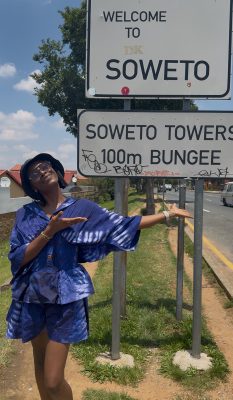Travelling is all fun and adventure but the most interesting thing about it is the opportunity to soak in new cultures and experience new places, food, music, food and people.
This is one of the reasons behind Zikoko’s Jollof Road trip. Five staff of the media outfit are on a tour of 14 West African Countries for 80days.
Setting out on such a road trip not only takes a lot of bravery but also the knowledge of what needs to be in your travel bag.
Beside the what-to, how-to and since it’s day 40 of the Jollof Road tour, here’s what we’ve learned so far from the adventurous trip:
Travel Essentials Are What They Are – Essential
According to the Zikoko team, the following must be in your travel kit:
Sunscreen: Unless you don’t want to end up looking like a burnt dodo, do your skin a favour by carrying some sunscreen. The sun in Nigeria differs from what you’ll feel across borders. Also, if you fear it will only add more weight to your luggage, opt for a “lightweight” tube of sunscreen.
A Drum of Water: Maybe not a drum per se, but be sure to carry many bottles of it in order to avoid buying some off the roadside. Alternatively, you can buy the water need you need as you progress on the trip.
First Aid Kit: Since upset stomach and headaches are almost guaranteed during long road trips, pack a mini first aid kit that contains painkillers and anti-diarrhoea drugs (Imodium).
Other items that should be in the kit include a lot of hand sanitisers, baby wipes, methylated spirit, cotton wool among other necessary items; it is not advisable to buy any sort of drugs from a place you barely know. You may want to carry some mosquito repellant cream, too. You will find out why later.
[ad]
Same Food, Different Name
It wouldn’t have made much sense if a tour tagged “Jollof Road” doesn’t involve any food adventures. Even though we all know how the popular Jollof rice connects all of West Africa, we are well aware of the fact that ‘man cannot live by rice alone but by ‘swallow’ as well”. In other words, there are so many similar meals asides Jollof rice that the beautiful people of West Africa have in common. This is one of the many things Zikoko staff details in their “Jollof Road Tour”.
In Ivory Coast, for instance, ba is a staple, but in different forms. While Nigerians make it in a as a single, mountainous lump, Ivorians cook theirs (Attiéké; pronounced A-CHE-KE) into several lumps.
Other meals like Igname Pilée (pronounced EE-nyam Pee-lay) is the Beninese version of our own pounded yam. Igname pillee is probably pounded in a mortar along with a bit of someone’s sweat.
When it comes to soups, okra seems to be the most widely accepted. The Ivorian version of okra soup is called “Le Gombo”. It’s also the same name in some other West African countries. Both Nigerian and Ivorian versions have similar recipes; at the end of the day, okra soup is still guaranteed to draw you closer to your plate.
It’s Voodoo, Not Witchcraft
Africa is known to be rich in culture; culture to many people mean different things. Generally, it is portrayed in historical artworks, language, food, music joints.
Back up a bit, Nollywood has been able to make people fully aware of the fact that witchcraft is real and often turned us into overly superstitious beings. But there is a big difference between Voodoo and Witchcraft, so we’ve learned.
According to the tour guide on the Togo leg of the Jollof Road trip, – Ahosi who comes from a long lineage of Voodoo priests and is also one himself – voodoo and witchcraft are two words often used interchangeably, even though they connote two very different things.
While voodoo is a religion, witchcraft is a practice which often involves all of the messiness you see in Nollywood movies, from money rituals to the smithing of enemies in calabashes.
Fun fact: The only openly fetish market in West Africa is called the Akodessewa Fetish Market and it is located in Togo. It is reputed to be the world’s biggest voodoo market.
[ad unit=2]
Divided by Borders, United By Corruption
The Zikoko team experienced, firsthand, the common threads that run through African cultures despite being divided by physical borders.
But in spite of this unity, there were times the five-man team experienced hostilities and were made to bribe officials who exploited them because they were foreigners. And being Nigerians added extra impetus to the demand for bribes for crooked border officials.
If you are lucky, none of the encounters might be aggressive enough to be outright offensive, but they just might get you frustrated to the point where you hate being Nigerian.
Malaria FC
Remember what we said about upset stomach and travelling with mosquito repellant cream in your bag?
Well, it appears two out of the Jollof Road five-man team took ill; one with a running stomach and the other with, of course. Because you are outside of Nigeria does not mean you have escaped from mosquitoes. In fact, the ones outside of our borders might even be nastier, so much that you will think they were sent after you by your village people.
So whatever techniques you used to tackle them back home might not be entirely helpful when you are on the other side of the border. But a repellant cream can be helpful.
That aside, you can’t fully trust the hygiene of anyone especially when it comes to food or whatever that you ingest. Any stale ingredients can lead to food poisoning.
Thankfully, the affected received treatment at the nearby clinic called the First Aid Action Guinea, located in Conakry.
Despite the downsides of this tour, there is evidently still more to come and learn; follow the remaining 40 days of “Jollof Road” and what it has to offer.








